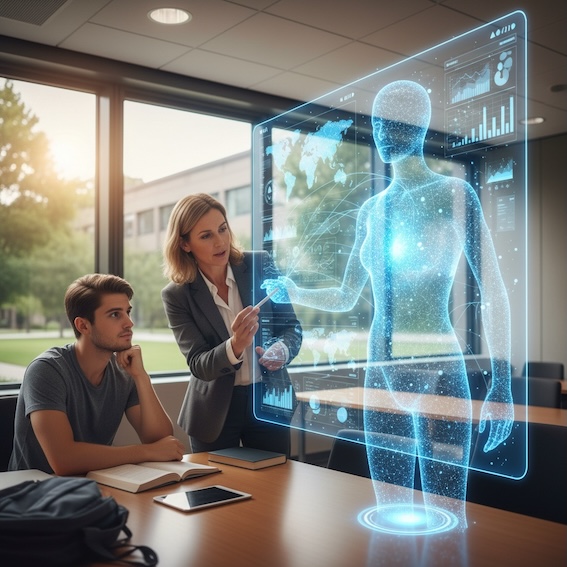
Keynote presenter
Professor Michael Cowling
Professor Michael Cowling (Professor Tech) is Professor of Computing Technologies and Director of the Hub for Apple Platform Innovation (HAPI) at RMIT University. A self-confessed technology enthusiast and award-winning educator, he makes AI and emerging tools accessible, practical, and fun for teachers and students alike. Michael is a frequent media commentator and keynote speaker who seamlessly blends research with storytelling, sparking meaningful conversations about how we can effectively integrate technology into our educational practices without losing sight of pedagogy. Whether in the classroom, on stage, or online, Professor Tech is always asking: how can tech help us teach better?

Register to attend
Don’t miss out on the opportunity to attend this exciting half-day symposium.
Register now to secure your place and be part of an inspiring half-day filled with thought-provoking presentations, networking opportunities, and collaborative discussions.

Provide Feedback
Feedback is vital for the improvement of any event. If you have attended the Symposium, or watched the recordings later, you can provide your feedback on how we can improve further:
Program
After registering (above), you will receive an email with the Zoom link to attend. Please ensure you are logged into your Zoom client on your computer to participate.
Abstract
The rise of generative artificial intelligence has prompted educators to reflect on its role in teaching and learning: even three years on, we still seem to be grappling with how it might impact our practice. This presentation focuses on the practical use of AI in education, moving beyond theory to provide actionable strategies for the classroom. We will explore approaches to integrating AI responsibly, framed through the AI Teacher Teaching Task Spectrum (AITTTS) and other educational technology models. The session will highlight how generative AI intersects with pedagogical practice, its varied impact across academic disciplines, and its potential as a tool to support the design, delivery, and assessment of learning activities. In addition, practical applications for academic staff will be shared, offering ways AI can assist with workload management and professional development. Attendees will leave with insights, examples, and strategies for navigating AI in education in ways that balance innovation, ethics, and student learning outcomes. (And in the spirit of practice—this abstract was generated with a little help from ChatGPT!)
Abstract
The proliferation of GenAI presents both profound opportunities and significant challenges for higher education, particularly in teaching foundational skills within online learning environments. This presentation examines the implementation of Lexi LawScribe, a bespoke AI writing tutor, in a first-year law unit. Adopting the GenAI-TPACK framework (Belkina et al, 2025), we analyse the integration of Lexi within the pedagogical requirements of legal writing instruction and the content demands of criminal law. The unique online delivery of the course provides a critical contextual knowledge lens, highlighting the need for scalable, on-demand student support. This presentation draws on an analysis of student usage logs from the AI tutor. We explore the patterns of student interaction to understand how they leverage the tool for learning. Initial findings indicate that students primarily use the AI tutor for scaffolding complex legal writing structures, receiving iterative feedback to refine their analysis, and reducing the cognitive load associated with mastering discipline-specific communication conventions. We conclude by providing practical, evidence-based recommendations for the future design of AI-driven learning support, aiming to enhance student engagement and success in online and blended learning contexts.
Abstract
We are living in a modern world of an education system where education is being transformed by the new digital environment. The smart digital technologies have grown exponentially over the past few years. Use of traditional teaching practices might be considered outdated in the modern digital era of technology, or even might not be possible in asynchronous online courses. One such teaching practice is writing on the board, which may not be possible for the asynchronous courses where recorded lectures are provided to allow students to learn on their own schedule. But integration of traditional practice into modern technology can be effective and useful in today’s education, such as the use of a glass light board. A Glass light board is a transparent glass surface, educators look through the glass directly at the camera and write with a neon pen, the image is then flipped and video recorded or live-streamed. This has been a very engaging and powerful tool for video presentations. Students can see an educator writing on the board, explaining the concept while talking and drawing and therefore, makes it more personal and connects learners to educators effectively. In this study, mini lectures were developed in a pathophysiology (PSIO230) unit in T1 2024 at UNE using a glass light board as an additional teaching resource. These lectures were created in UNE‚ media studio for the light board, and pathophysiological mechanisms were explained on the light board using neon pens of different colours. These lectures were only 20 minutes long, recorded videos, and all the students in that cohort loved these lectures, which made a profound impact on their learning of difficult concepts and engagement with the unit content, as per the student feedback and unit evaluation data. These will be utilised again, and a formal study will be conducted in 2025.
Abstract
Assessment in the era of Generative AI presents two challenges – how teachers can effectively share specific permitted GenAI use for a task, and how students may share with their instructors how they have used it. Previous models of GenAI integration into assessment generally exist on a vague spectrum, with little specificity. PETRA AI (PErmissive and TRAnsparent) is a single-page web application that addresses these challenges by providing teachers a way to permit specific and fine-grained use of GenAI for an assessment task in the form of a digital badge, while also allowing students to share how they used AI for a task to ensure compliance and transparency.
Abstract
NOTE: Due to a technical issue, Matt was not able to present during the Symposium. The recording of the presentation is uploaded here.
This paper is a response to the recent Assessment Architecture at UNE and its recognition that for many forms of traditional assessment – notably essay-writing which is widely used in the humanities – we cannot assure ourselves that students have not used so-called Generative ‘Artificial Intelligence’ (Gen-AI). Underlying the architecture is an implicit assumption that without such assurance, students will cheat. Viewed from the perspective of the sociology of deviance, this is a kind of control theory grounded in (arguably discredited) ideas about rational choice, specifically that in the absence of constraints, humans are as self-serving as possible. In contrast, my paper is grounded in a very different understanding of how students think and choose. By articulating the ethical and political reasons not to use gen-AI, I aim to encourage students to make an informed decision about not using it. In particular, I want to persuade students that developing their skills in reading, thinking and writing, independent of Gen-AI, is essential to the humanities. I therefore call on students to train their human intelligence, rather than a privately owned technology that is implicated in the resurgence of fascism.
Abstract
Australian universities are increasingly permitting the use of GenAI in assessments, and yet, empirical evidence on its effects on student knowledge retention is lacking. Methods: Guided by Process-Oriented Pedagogy, we designed a student-centred assignment for first-year marketing (MM110) students (n = 183). Students self-reported their Gen-AI use and submitted reflections on the process, documenting iterations, actions, rationales, and supporting evidence. More importantly, informed by Open Systems Theory and Triple-Loop Learning, the marking rubric was developed incorporating “Input–Process–Output” elements with six sub-criteria scaled across three learning levels. Assignment marks were then compared with the marks of the invigilated exam to evaluate knowledge retention. (HREC HE-2025-2429-4050). Findings: GenAI users achieved significantly higher assignment scores than non-users (M = 11.30 vs. 9.86, p= .001). Effects varied by usage pattern: data analysis (M = 11.48 vs. 10.02, p= .001) and minor editing (M = 11.23 vs. 10.63, p = .036) were associated with significant gains, whereas content writing was not. Process marks correlated strongly with other assignment components (r = .50–.80) but only weakly with exam performance (r = .18, p = .016). Overall, the use of different forms of GenAI in assignments did not significantly influence exam outcomes, suggesting that GenAI neither enhanced nor diminished knowledge retention. Implications: GenAI tools were most effective when used to scaffold analytical and editorial processes rather than for generating the content. Students who preserved an authentic voice while employing GenAI for analysis scored better in assignments, fostering critical thinking without undermining knowledge acquisition.
Conference organising committee
We’re doing 3 Symposia this year!
This is our last one of the year! Have a look back at our themes and watch previous presentations!



